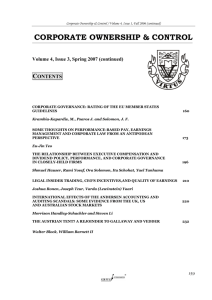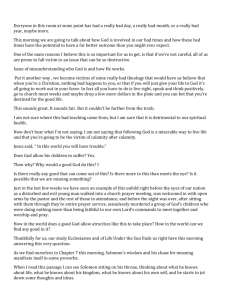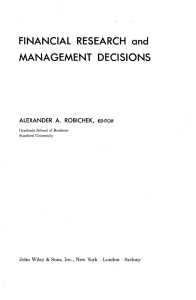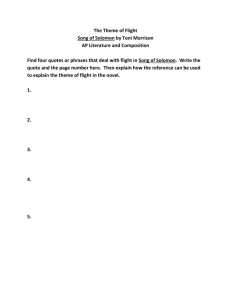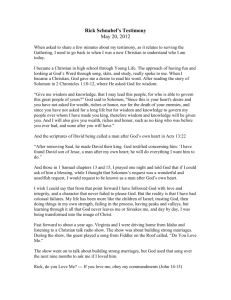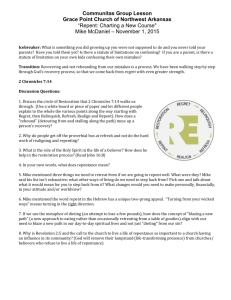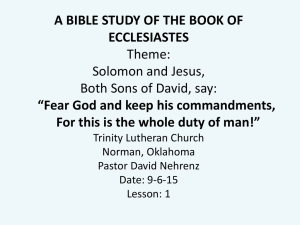Chapter 11: Wise King Solomon
advertisement
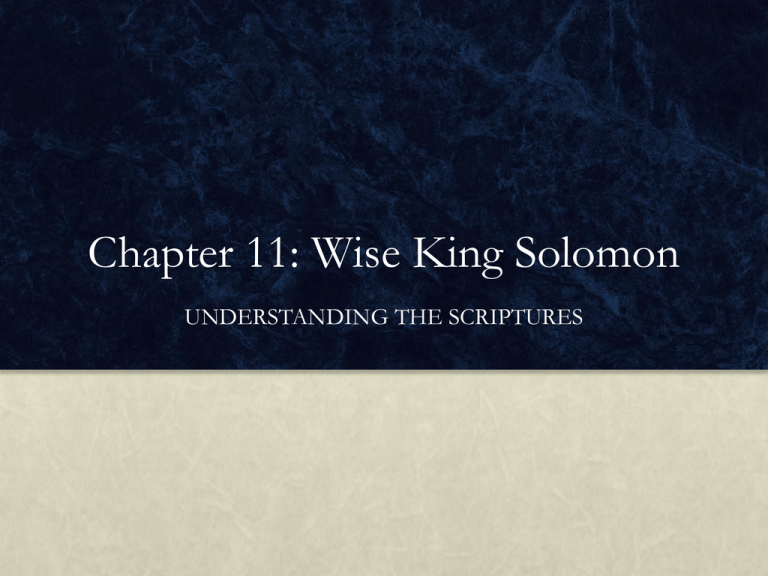
Chapter 11: Wise King Solomon UNDERSTANDING THE SCRIPTURES 1. Solomon’s Wisdom and Greatness (pp. 208–213) ANTICIPATORY SET Imagine finding a magic lamp and summoning what turns out to be a one-wish genie. What would your one wish be? God actually put Solomon in this position, and in this lesson we will see if he wished for the best possible gift. 1. Solomon’s Wisdom and Greatness (pp. 208–213) BASIC QUESTIONS What blessing did God grant Solomon? What was Israel’s international standing during the reign of Solomon? What is the relationship between the Davidic Covenant and the wisdom literature of the Old Testament? KEY IDEAS When God offered Solomon anything he would ask for, Solomon requested only wisdom to govern God’s people. In reward for this answer, God gave Solomon great wisdom as well as wealth and honor. Israel under Solomon’s leadership became an international power. The Davidic Covenant began to be fulfilled as people saw the favor God bestowed on Solomon and Israel. The Solomonic wisdom literature became the new “law” for the nations, even incorporating into the Sacred Scriptures the best of pagan wisdom literature. 1. Solomon’s Wisdom and Greatness (pp. 208–213) FOCUS QUESTIONS What did God offer Solomon? God offered anything Solomon wanted. For what did Solomon ask? He asked for wisdom and knowledge so he could rule God’s people. What did God give him? God gave him wisdom; knowledge; and, on top of that, riches, possessions, and honor, which surpassed the kings who went before him and the kings who would succeed him. 1. Solomon’s Wisdom and Greatness (pp. 208–213) GUIDED EXERCISE Christ instructed his followers in this way: Do not be anxious, saying, “What shall we eat?” or “What shall we drink?” or “What shall we wear?” For the Gentiles seek all these things; and your heavenly Father knows that you need them all. But seek first his kingdom and his righteousness, and all these things shall be yours as well (Mt 6:31– 33). Write about the application of Christ’s words to Solomon. Briefly share responses. 1. Solomon’s Wisdom and Greatness (pp. 208–213) FOCUS QUESTIONS How did Egypt make Israel an exception to its own practices regarding intermarriages? Because of Egypt’s great stature, other nations sent sons and daughters to the court of Pharaoh, but Pharaoh never sent his daughters to foreign courts. In Solomon’s case, however, Pharaoh sent his daughter to Solomon. Why did Egypt desire an alliance with Solomon? Solomon was an empire builder whose realm would stand between the two great empires of Egypt and Assyria. Pharaoh would have wanted Solomon’s power to be allied with him rather than with his enemy. What do Solomon’s multitudinous wives and concubines symbolize? The symbolically perfect numbers of 700 wives and 300 concubines show Solomon had intermarried with all the nations and, in that way, extended his dominion to the ends of the earth. 1. Solomon’s Wisdom and Greatness (pp. 208–213) FOCUS QUESTIONS How was Solomon punished for polygamy? He was led to his wives’ false gods and away from the one true God, who had given him everything he possessed. How did Solomon make Israel an international power? Besides having conquered the nations around him, he sent traders all over the world and built a substantial navy, making Israel a maritime power. Why did the Queen of Sheba come to see Solomon? She wanted to see if Solomon was as wise as people said and, probably, to establish a trading alliance with him. 1. Solomon’s Wisdom and Greatness (pp. 208–213) FOCUS QUESTIONS Using the Queen of Sheba as an example, how did Solomon’s wisdom draw the world to God? The wisdom and wealth of Solomon, which came from God, led the Queen of Sheba to praise the God of Israel. Who authored the wisdom literature? Much of the wisdom literature is attributed to Solomon; it was written either by him or by other wise people in the character of Solomon, who is an archetype of all wisdom. 1. Solomon’s Wisdom and Greatness (pp. 208–213) FOCUS QUESTIONS Why would an Israelite not have rejected the wisdom of other cultures? All wisdom is from God. If a writing or person is truly wise, it reflects God’s wisdom, and therefore it possesses true value. Universal truths can be understood by all. What was the purpose of the Davidic Covenant, and what was its “law”? The purpose of the Davidic Covenant was to draw all men to God, and it did so through its new “law,” the wisdom literature. How did the sources of the new “law” help fulfill the Davidic Covenant? The new “law,” the wisdom literature, spoke to the nations in a language they could understand, even including parts of those peoples’ own wisdom traditions. Solomon’s wisdom was the same as the Egyptians’ and the Babylonians’ except it surpassed theirs. 1. Solomon’s Wisdom and Greatness (pp. 208–213) GUIDED EXERCISE As one of the most famous examples of Solomon’s prudence and wisdom, read 1 Kings 3:16–28. Then work with a partner to analyze the illustration on page 212. Share responses. 1. Solomon’s Wisdom and Greatness (pp. 208–213) CLOSURE Free write for five minutes about the relationship between the Davidic Covenant and the wisdom literature. 1. Solomon’s Wisdom and Greatness (pp. 208–213) HOMEWORK ASSIGNMENT Study Questions 1–8 (p. 219) Practical Exercise 1 (p. 220) Workbook Questions 1–8 Read “Solomon Builds the Temple” through “The Idol Gods of Solomon’s Wives” (pp. 213–217) 1. Solomon’s Wisdom and Greatness (pp. 208–213) ALTERNATIVE ASSESSMENT Proverbs 10 presents thirty-two wise sayings. Write a paragraph explaining what your assigned proverb means. In your assigned group, share your paragraphs. 2. Solomon’s Temple and His Apostasy (pp. 213–217) ANTICIPATORY SET Review the seven primary features of the Davidic Covenant (cf. p. 203). Discuss the extent to which that covenant was fulfilled in Solomon. 2. Solomon’s Temple and His Apostasy (pp. 213–217) BASIC QUESTIONS What was the significance of the Temple Solomon erected? What was the outcome of Solomon’s wealth and pride? How were Solomon and Israel punished? KEY IDEAS The Temple, the architectural symbol of Israel’s covenant with God and built by Gentiles, was “a house of prayer for all peoples.” Solomon fulfilled Samuel’s warning by oppressing the people. Solomon’s polygamy was punished by allowing him to fall into apostasy, dragging the kingdom with him. 2. Solomon’s Temple and His Apostasy (pp. 213–217) FOCUS QUESTIONS What did the Temple represent? It was the architectural sign of Israel’s covenant with God as the place where God’s glory dwelt among them in the Ark. Why did Solomon ask God to grant the prayers of Gentiles? Had the visitors’ prayers been answered, they would want to know the name of and worship God. Extension: “Knowing God’s name” implies Solomon wanted everyone to know the nature of the God of Israel: he is the only God and existence itself. “Fear” is the fear a good son feels toward offending his good father and is “the beginning of wisdom” (Ps 111:10; Prv 9:10). 2. Solomon’s Temple and His Apostasy (pp. 213–217) FOCUS QUESTIONS What did it mean to call the Temple “a house of prayer for all peoples”? Solomon’s hope was for people from all over the world to come to the Temple to pray to the one true God. How did Solomon act as a universal priest according to the Catechism, no. 2580? Solomon prayed for the entire People of God, present and future, for God to forgive their sins and provide for their daily needs. What are some other ancient traditions about the site chosen for the Temple? The Temple was situated on top of the gate of Sheol, the underworld, and the Temple was blocking it, sealing off Hades. Another tradition holds it was situated on the very spot where Abraham offered his son Isaac as a sacrifice. 2. Solomon’s Temple and His Apostasy (pp. 213–217) FOCUS QUESTIONS What was the source of the wood for the Temple? It came from the famous cedars of Lebanon. How was the wood for the Temple transported? The trees were brought to the sea, floated down the coast to Joppa, then drawn to Jerusalem. Why was there no sound of tools in the Temple during construction? The stone was cut from an underground quarry, so no sound could reach the Temple. 2. Solomon’s Temple and His Apostasy (pp. 213–217) GUIDED EXERCISE A class discussion using the following question: Why is it impossible to have a true marital relationship when one has two or more spouses? GUIDED EXERCISE Conduct a think / pair / share using the following question: How was Solomon’s wealth “unconstitutional”? 2. Solomon’s Temple and His Apostasy (pp. 213–217) FOCUS QUESTIONS What did Solomon’s wives finally persuade him to do? They turned his heart away from the one true God toward their false gods, and he built temples to those gods. What was Solomon’s initial aim by building the Temple, and how was that aim reversed? Solomon began with the aim to draw all the pagan peoples of the world to the one true God, but after time he began to draw the Israelites to false, pagan gods. What was particularly horrible about the false gods Chemosh and Molech? They required the sacrifice of children. 2. Solomon’s Temple and His Apostasy (pp. 213–217) CLOSURE Scan this chapter and write down what you believe to be the main objectives. Briefly share results. 2. Solomon’s Temple and His Apostasy (pp. 213–217) HOMEWORK ASSIGNMENT Study Questions 9–15 (p. 219) Practical Exercises 2–3 (p. 220) Workbook Questions 9–16 2. Solomon’s Temple and His Apostasy (pp. 213–217) ALTERNATIVE ASSESSMENT Write a paragraph about the reign of Solomon as both a blessing and a curse for Israel. The End
